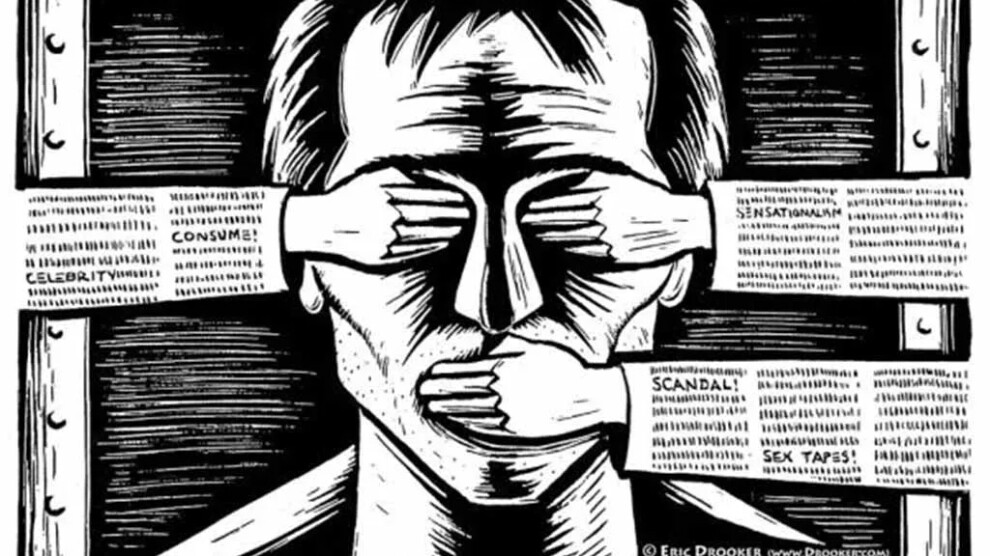Over 137,000 web addresses blocked in Turkey in 2022
Among the blocked web addresses, over 6,000 were news articles. "Violation of privacy" was the most common reason for censoring news reports.
Among the blocked web addresses, over 6,000 were news articles. "Violation of privacy" was the most common reason for censoring news reports.

The Freedom of Expression Association (İFÖD) released its annual Blocked Web report for 2022, shedding light on internet censorship in Turkey. According to the report prepared by Prof. Dr. Yaman Akdeniz and Researcher Ozan Güven from Istanbul Bilgi University's Faculty of Law, over 137,000 URLs faced access restrictions in Turkey within a year.
The report provides insights into the magnitude of access restrictions imposed by various state institutions in response to their requests.
Since 2006, a total of 814 different state institutions and judiciary bodies have issued 616,239 access blocking decisions. Consequently, 712,558 addresses were blocked from access.
During this period, the Information Technologies and Communication Authority (BTK) blocked 496,476 addresses, and the Telecommunications Communication Presidency (TİB) blocked 129,164 addresses until its closure in August 2016. Other notable contributors to access blocking include the Turkish Football Federation (TFF) with 22,585 blocked addresses, the Ministry of Health with 10,020 blocked addresses, and the Capital Markets Board (SPK) with 6,159 blocked addresses.
The report highlights that censorship practices in 2022 exceeded the record set in 2021. The number of internet sites subjected to state-imposed censorship increased by 28% compared to the previous year, with a total of 137,000 domain names being blocked.
"Violations of the right to privacy"
In recent years, one of the most common justifications for blocking news content has been "violations of the right to privacy." In 2022, a total of 6,528 news reports, deemed to have public interest, were blocked due to decisions related to "violations of the right to privacy." NEws sites removed 5,388 of those articles.
Most of the 954 different court decisions, issued by 270 different peace judgeships, were granted in response to requests from high-level public figures, certain public institutions, and companies close to the government.
Regarding this issue, the report states, "Peace judgeships continued to neglect freedom of expression and press freedom, the public's right to access information, and the public interest, while acting as guardians of the reputation, honor, and dignity of high-level public figures."
Outlets facing censorship
In 2022, the internet site of the government-friendly newspaper Sabah had the highest number of news reports blocked. A total of 304 reports from Sabah were censored, and the newspaper voluntarily removed 291 of them (96%) from its website.
Following Sabah, the news site Haberler.com ranked second with 247 reports blocked, of which 245 (99%) were removed from its website.
Cumhuriyet newspaper ranked third with 235 reports blocked, of which 185 (79%) were taken down from its website.
Other news outlets like Sondakika.com with 229 blocked reports, Takvim with 225 blocked reports, and Milliyet, Hürriyet, Habertürk, T24, BirGün, soL Gazete, Sözcü, Yeniçağ, Patronlar Dünyası, Mynet.com, Gazete Vatan, A Haber, Yeni Akit, Gazete Duvar, CNN Türk, Gerçek Gündem, Onedio, Ensonhaber.com, Diken, and Halk TV also faced blocks on their reports.
Criticism against the Constitutional Court
The report highlights that the "Law on the Regulation of Publications on the Internet and Combating Crimes Committed through These Publications," in effect since 2006, has undergone 19 revisions. However, they point out that the loopholes in the law persist.
The report also criticizes the Constitutional Court to which appeals against access restrictions are made. It asserts that the Constitutional Court has remained ineffective. In their report, the two researchers state:
"The title of the 2022 Blocked Web report, a continuation of the 2018-2021 EngelliWeb reports, is designated as 'Under the Shadow of Peace Judges: The Constitutional Court.' As seen in the report, thousands of news articles and content deemed to serve the public interest have been subjected to access blocking, removal from publication, censorship, and deletion from archives due to decisions based on 'violations of the right to privacy,' just like in previous years.
"Despite identifying 'structural problems' concerning Article 9 of Law No. 5651 in October 2021, the Constitutional Court failed to implement its own 'pilot decision' and has not issued any rulings on Article 9 applications in 2022. This clearly shows that the ongoing issues have become part of an ineffective domestic legal remedy."
Note: In Turkey, peace courts, the Information Technologies and Communication Authority (BTK), and the Association of Access Providers (ESB), along with relevant ministries, the Radio and Television Supreme Council (RTÜK), the Presidency of Religious Affairs (Diyanet), the High Election Board (YSK), the Capital Markets Board (SPK), the Banking Regulation and Supervision Agency (BBDK), the National Lottery, the Turkish Jockey Club, the Spor Toto Organization Presidency, the Turkish Football Federation, and the Tobacco and Alcohol Regulation Authority, as well as enforcement offices, have the authority to impose access restrictions.
Source: Bianet